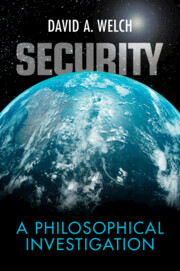3 results
Introduction
-
- Book:
- Security
- Published online:
- 18 August 2022
- Print publication:
- 25 August 2022, pp 1-9
-
- Chapter
- Export citation
1 - The Meaning of ‘Security’
-
- Book:
- Security
- Published online:
- 18 August 2022
- Print publication:
- 25 August 2022, pp 10-31
-
- Chapter
- Export citation

Security
- A Philosophical Investigation
-
- Published online:
- 18 August 2022
- Print publication:
- 25 August 2022

